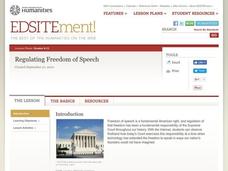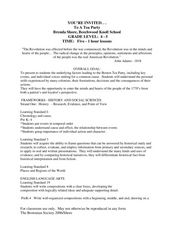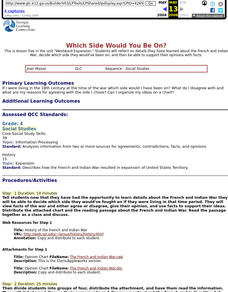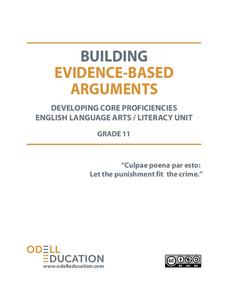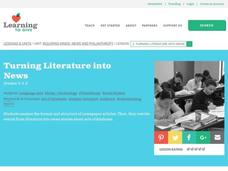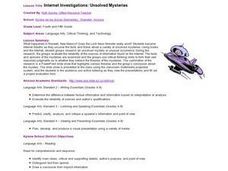Curated OER
Genetic Engineering: Friend or Foe?
Students brainstorm and discuss ways genes can be altered, transferred and cloned. They will complete a subject sampler, opinion paper and prepare to debate their opinion on genetic engineering.
Curated OER
Regulating Freedom of Speech
Pupils examine the nature and limits of the Constitutional right to freedom of speech. They read and analyze the First Amendment, discuss various case studies, and research and record their own opinion on discussion questions.
Curated OER
The Furry News: How to Make a Newspaper
Students investigate the process of making a newspaper using children's literature to create context for the lesson. The readers are asked to predict the events of the story as it is read to them. Then the teacher uses guided questions...
Curated OER
Teaching Others About Being Deaf
Pupils read two articles about how college students taught others about being blind or deaf. In their school, they interview pupils with a physical challenge and use the internet to research how to write about those with disabilities....
Curated OER
Literature Review Paragraph
Tenth graders review the structural elements of a literary paragraph and organizational paragraph formats. They author a paragraph examining and reviewing a piece of literature currently being read in class. Students peer-review the...
Curated OER
Women and Korean Literature
Students read a text about women in Korean and their role in Korean literature. In this Korean literature lesson, students read a text by Helen Koh to learn about women writers in Korea.
Curated OER
Conflict Resolution in 9 Easy Steps
Students investigate student psychology by reading assigned text about nonviolence. In this conflict resolution instructional activity, students read nine specific steps they should take the next time they are in an argument with...
Curated OER
The Figure of Paul Revere. Romanticizing Colonial American History
Pupils compare paintings to make conclusions about American History in the Revolutionary War time period. Students share opinions concerning visual art. Other artwork can be used to entice inquiry as needed.
Curated OER
You're Invited...To A Tea Party
Kids read the book Boston Tea Party by Steven Kroll and use maps to locate various landmarks. They identify the cause and effect of the events related to the Boston Tea Party, then write a descriptive composition.
San José State University
Writing Concisely: Deleting or Replacing Unnecessary Information
Are you actually feeling really tired of reading wordy, redundant, long, lengthy sentences practically all the time over and over again? Introduce writers to this handout and exercise to teach to tighten up their prose! Provides two ways...
Curated OER
Which Side Would You Be On?
Fourth graders describe how the French and Indian War resulted in expansion of United States Territory and analyze information from two or more sources for agreements, contradictions, facts, and opinions.
Curated OER
Marketing the New Hybrids
High schoolers work together to develop a hypothesis on the natural and applied hybridization of certain species in an ecosystem. Using the internet, they research this topic and read any recent articles or studies. They must note the...
Curated OER
Ida Tarbell: Hysterical Woman vs. Historical Facts
Students examine journalism and its different styles. In this effective communication instructional activity students create an editorial message and articulate an article.
Curated OER
Tooling Around Arizona: Reading Arizona Maps
Students research Arizona maps. In this map lesson, students discuss map titles, scales, directions, elevation, and symbols. The class will examine topography, landforms, and rivers found on an Arizona map.
Social Media Toolbox
Ethical Decision Making
When faced with a dilemma, how do journalists decide how much news to use? Social media scholars explore the philosophies of ethical resolution in the first of a 16-part Social Media Toolbox series. Partnered pupils use a Potter Box to...
Florida Center for Reading Research
Comprehension: Text Analysis, Fiction and Nonfiction Find
Scholars analyze fiction and nonfiction text and fill in a worksheet detailing the text's title, genre, and reason for its classification.
Curated OER
Telling Our Stories of Giving - Writing to Persuade
After identifying the parts of a persuasive piece of writing, young writers explore different prewriting activities for the persuasive essay. They have the option to write a news article, personal narrative, or persuasive essay to...
Odell Education
Building Evidence-Based Arguments: "Cuplae poena par esto: Let the punishment fit the crime."
Should a criminal's punishment match the crime? An argumentative writing plan explores this question as class members investigate a variety of mixed-medium sources by experts in the field, form evidence-based claims, and support them...
Curated OER
Dinosaur Designs
Second graders examine facts that can be found in nonfiction books. They listen to a read aloud of Patrick's Dinosaur, with time before the end for student predictions. They make dinosaur t-shirts using facts from the book.
Pennsylvania Department of Education
Stories? Information? What's the Difference?
Students listen to a power point presentation to distinguish between fiction and nonfiction text. In this what's the difference lesson, students identify fact from opinion within a text. Students listen critically and respond to text.
Curated OER
Inquiring Minds: News and Philanthropy
Students study newspaper articles and rewrite events from literature into news stories about kindness. In this news article lesson, students read sentences from newspaper articles and identify the purpose of the article. Students...
Curated OER
Ethical and Critical Thinking: Genetically Modified Food
Young scholars read statements representing different points of view on Genetically Modified Food. They identify the "facts" and "opinions" in each statement, and then briefly summarize the issue of Genetically Modified Food in a short...
Curated OER
Internet Investigations: Unsolved Mysteries
Students conduct Internet research to investigate the facts and fiction of various unsolved mysteries. They examine the facts and opinions of the mysteries, and create a Powerpoint slide show to present the theories and the group's...
Curated OER
Gators at the Gate!
In this endangered species learning exercise, students will read 10 statements about alligators and determine if the statement is a fact or an opinion. Then students answer 1 short answer question.
Other popular searches
- Reading Fact and Opinion
- Fact vs. Opinion Reading
- Reading Fact or Opinion
- Fact vs Opinion Reading
- Fact and Opinion in Reading



